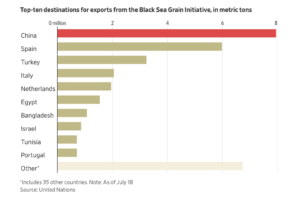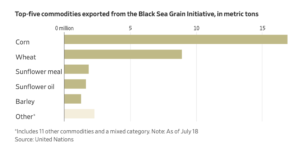A prolonged military conflict in the Middle East could potentially upend key commodity markets due to Iran’s control of the Strait of Hormuz, one of the world’s most important trade…
Ukraine Ports Attacked For Second Consecutive Night, as U.S. Announces Ukrainian Agricultural Aid
New York Times writer Gabriela Sá Pessoa reported yesterday that, “The United States Agency for International Development announced a total of $750 million in new assistance to Ukraine on Monday and Tuesday, with $500 million dedicated to humanitarian aid and $250 million to support the country’s farmers after Russia refused to extend a Black Sea grain deal.
“Samantha Power, the head of the agency, announced the new humanitarian aid on Monday during a visit to Kyiv, the Ukrainian capital, in the hours after Moscow left the grain deal, which had enabled tens of millions of tons of Ukrainian grain to reach world markets via the Black Sea. The move sent grain prices fluctuating on world markets, and raised fears that global food instability would worsen.”
No more critical time to be back in Odesa with @PowerUSAID and @OlKubrakov. One day after Russia suspends participation in the lifesaving Black Sea Grain Initiative, @USAID announced an additional $250 million to support the agriculture sector, a pillar of Ukraine's economy and… pic.twitter.com/nmAxVNfxC9
— Ambassador Bridget A. Brink (@USAmbKyiv) July 18, 2023
The Times article indicated that, “The new funds will go toward food assistance, health and hygienic care, and providing emergency shelter, the agency said, and bring the total in U.S. humanitarian support for Ukraine to $2.6 billion, not counting $475 million in emergency funds that have helped repair and maintain Ukraine’s heating and power systems.
“Ms. Power continued her visit to Ukraine with a stop in Odesa on Tuesday, when USAID issued a statement saying that $250 million in new aid would be funneled into the Agriculture Resilience Initiative-Ukraine, a program launched in July 2022 by USAID with contributions from both the government and the private sector.”
Meanwhile, Matthew Luxmoore and Jared Malsin reported in today’s Wall Street Journal that, “Russia launched one of its largest missile attacks on Ukraine’s grain-exporting port of Odesa just hours after pulling out of an international agreement ensuring safe passage for Ukraine’s exports through the Black Sea, a critical component in the global food supply chain.
“The wave of missile attacks in the early hours of Tuesday specifically targeted the port, said Natalia Humenyuk, a spokeswoman for the Ukrainian armed forces’ southern command, adding that authorities had been expecting such a strike.”
The article noted that, “The attacks came during a visit to Odesa of a delegation from the U.S. Agency for International Development, which on Tuesday announced a $250 million aid package to expand capacity at ports along the Danube River, modernize and rebuild infrastructure used in grain exports. A portion will also be used to help farmers hit by Russia’s decision to plant new crops even if previous harvests haven’t yet sold.”
Luxmoore and Malsin pointed out that, “Samantha Power, the head of USAID, said during a visit to Odesa that the U.S. financial assistance package would help expand alternative export routes for Ukrainian farmers such as sending grain on smaller ships via the Danube River into the Black Sea.”

The Journal article added that, “Power didn’t elaborate on the timeline for the funds to reach Ukraine. She said the U.S. recognizes their urgency as the Russian invasion has forced a halt to all exports from Ukraine’s main Black Sea ports, contributing to a surge in global food prices and fueling fears that the war could push millions of people around the world closer to starvation.”

And today, Reuters News reported that, “Ukrainian air defence systems were engaged in the early hours of Wednesday in repelling a Russian air attack on the southern port of Odesa for a second consecutive night, the region’s governor said.
“Russia struck Ukrainian ports on Tuesday, a day after pulling out of a U.N.-backed deal for safe Black Sea grain exports, a decision that raised concern primarily in Africa and Asia of rising food prices and hunger.”
Yesterday, Reuters writer Jonathan Saul reported that, “A cargo insurance facility providing cover for Ukraine grain shipments via a safe sea corridor has been suspended after Russia quit the United Nations-backed agreement, broker Marsh said on Tuesday.”
“The marine cargo and war facility led by Lloyd’s of London insurer Ascot, together with other underwriters, provided cover of up to $50 million per cargo,” the article said.
Reuters writer Gabriela Baczynska reported yesterday that, “The European Union is seeking to transport more Ukrainian grains via road and rail to help make up for Russia’s withdrawal from a U.N.-backed Black Sea exports deal, the bloc’s leaders and officials said.”
However, Bloomberg writers Piotr Skolimowski, Daniel Hornak, and Veronika Gulyas reported yesterday that, “Poland, Slovakia and Hungary justified their intention to extend local sales bans on Ukraine grain until the end of the year, even amid concerns that Russia’s decision to end a grain-export deal with Kyiv may disrupt food supplies.
“The three countries — together with Bulgaria and Romania — currently have restrictions in place on purchasing some of the country’s grain until mid-September, after declining prices spurred protests from local farmers. The European Union agreement still allows transit shipments to countries elsewhere.”
Today, Reuters writer Max Hunder reported that
Farmers whose work on Ukraine’s fertile land has long been vital to its economy fear losing their livelihoods after Russia this week quit a wartime deal allowing the safe Black Sea export of grain.
And Reuters writer Michelle Nichols reported yesterday that, “There are a ‘number of ideas being floated’ to help get Ukrainian and Russian grain and fertilizer to global markets after Moscow quit a deal allowing the safe Black Sea export of Ukraine grain, the United Nations said on Tuesday.”
Reuters News reported today that, “Russia said on Wednesday the United Nations had three months to implement the terms of a memorandum that would facilitate Russian agricultural exports if it wanted Moscow to resume talks about allowing Ukrainian grain exports to restart.”
Also, The Wall Street Journal editorial board indicated in today’s paper that, “Vladimir Putin wants sanctions relief, and he’s again threatening the global food supply to get it. On Monday Russia withdrew from the Black Sea Grain Initiative that had facilitated Ukrainian grain exports. Mr. Putin followed on Tuesday with missile attacks on the Ukrainian grain-exporting port of Odesa.”
The Journal noted that, “On Monday Ukrainian President Volodymyr Zelensky said ‘we are not afraid’ and ‘even without the Russian Federation, everything must be done so that we can use this Black Sea corridor.’ He deserves Western support.
“When Russia briefly suspended participation in the grain initiative last fall, Ukraine, Turkey and the U.N. moved forward with plans for shipments anyway. The Kremlin ended up rejoining the agreement, and it’s worth calling the Kremlin’s bluff again.
“Russia wants renewed access for the state-owned Russian Agricultural Bank to the Swift system that facilitates cross-border payments, among other Western concessions. But this would blow a sizable hole in sanctions. More important, Mr. Putin would learn that it works to hold the world’s food supply hostage.
“Mr. Putin is capable of anything, but he’d be taking considerable risks if he used military power to enforce a food blockade. The U.S. and the world should let him know that if he does, the result will be a naval escort operation in the Black Sea.”





